
|
|
In Memory's Eye (Part 2) John Ward Honourable Members
It was at an evening meeting of the committee when Walter Pitman, a high school teacher, who had been elected the Member for Peterborough, Ontario, in a by-election only months previously, posed a question to the chief witness, Lorne Gray, the Chairman of Atomic Energy Canada. AEC favoured one particular process, later widely used in CANDU reactors built for use in Canada and also exported abroad. Pitman's was a relatively simple question. The answer was anything but simple. As I was taking it down in shorthand, I placed a notation to query it later. It didn't seem to make sense, and I knew that Charlie Empringham, the committee branch editor, was bound to question what I would transcribe. At the end of the meeting I went to Mr. Gray and explained that I wished to check what he had said in his reply. He waited graciously as I read out, word for word, exactly what he had said. Then I asked was what I had taken down what he meant to say. "Yes," he replied. "But it doesn't make sense," I blurted out. Remember, I had just been in Canada a few months at the time. He smiled, and said: "Leave it exactly as it is." I had learned a valuable lesson which was to stand me later in good stead. In fairness to Mr. Gray, and in view of recent scandals involving the huge meal and entertainment expenses of some public office holders, I must record that when asked about the great number of meetings he had to hold, and how he could find time to do so, he said he found lunch a fruitful time for discussions and consultations. On such occasions, lunch was prepared by a member of his staff, if memory serves, by his secretary, and eaten in the boardroom. What an example for the mandarinate of today! Walter Pitman was a decent, sincere, and dedicated member of the newly formed New Democratic Party. His career in Parliament was quite short but memorable.
She earned the respect of members on both sides of the House. Not given to histrionics, she quietly and efficiently responded to questions. In her person and deportment she was the ideal Canadian to herald the advancement of women to cabinet rank. Many others would follow, making their mark as befitted their individual talents and temperaments, often objects of fierce media scrutiny, but all beholden to Ellen Fairclough, first lady member of government in Canada.
It was thanks to Dick Bell that I first gained admission to the Visitors Gallery reserved for guests of government members, and there I sat, day after day, learning to recognize the faces of Members seated below. It was a good vantage point from which to study not only their physiognomies but also learn to recognize their widely diverse accents. Bell had a unique background within the Progressive Conservative Party. He knew its innermost workings. In his early twenties he became secretary to the then Minister of National Revenue, assistant Dominion Organizer for the party, private secretary to the PC Leader of the Opposition, National Director of the Party in the 1940s, and served as chairman of its National Campaign Committee and of its 1956 National Convention held in Ottawa. In later life he served the cities of Ottawa and Nepean with distinction, and in various capacities with Carleton University, the Queensway Carleton Hospital, and the Canadian Cancer Society. I remember him as a kindly, affable man, unstinting in his service to Parliament and Party.
It was a personal win without parallel in post-WWW II Canadian history. Howe had seemed unbeatable. Fisher's victory gave heart to "the common man", a term still in vogue, and helped inspire the drive to establish the New Democratic Party which would unite the forces of agriculture and labour and, with luck, become a credible alternative to the Liberal and Conservative parties. Doug Fisher soon became a man to be reckoned with on Parliament Hill. His war-time service as a trooper in the Canadian Armoured Corps from 1941 to 1945 gave a sense of discipline that he exercised throughout his career in the Commons and in his later life as observer and shrewd commentator on politics, both in print and on television. He never shrank from tackling the powerful, in and outside Parliament. His annual battles, and there is no other word to describe them, with Donald Gordon, acerbic, over-bearing President of Canadian National Railways, became the stuff of legend. Estimate hearings into the affairs of the CNR and its airline, TCA, later to become Air Canada, were held each year in the Railway Committee Room in the Centre Block of Parliament Buildings. A spacious room, it was also used for Liberal and Progressive Conservative caucus meetings. Gordon would enter the room with a coterie of managers of this and managers of that, ready to assist him if needed. Fisher depended on his own research which he used to great effect in the coming fray. And he refused to be brow-beaten. Usually the room was filled with an audience drawn irresistibly to listen to the exchanges. The parliamentarian and the great railway panjandrum never disappointed. After quitting the political realm, Fisher soldiered on as only an old trooper can, adding to his reputation as a good and worthy servant of Canada, championing its sports, especially hockey-ice hockey for those ignoramuses who don't know better-and entered on a lengthy career in journalism. Years and years later, when I met him in a Loblaw's grocery store in Ottawa, he still was able to recall the names of Hansard reporters whom he knew during his time "on the Hill". The NDP never met the hopes once held for it, and was destined to become "the conscience of Parliament" rather than a serious alternative to the Liberals and Conservatives.
Hales followed a well trodden path on his way to the Commons, Director of the Y.W.C.A., President of the Guelph Chamber of Commerce, Alderman of the City of Guelph, Navy Reservice sub-lieutenant, and Kiwanis club member. He had been a graduate in scientific agriculture of the Ontario Agricultural College, and proudly listed winning the North American Meat Judging Award among his earlier accomplishments. It was largely, if not mainly, due to his regard for the House of Commons as an institution that a major change was effected in the staffing of the Chamber. Pages had traditionally been engaged locally. Many came from poor backgrounds, and the sessional employment they received helped lift themselves and their families one rung up the ladder in the climb to better economic conditions. Some boys became pages at a very early age, and with the passage of time became permanent members of the staff. One of these was Eddie Quirk of Alymer, Quebec, who was 12 when he joined the page staff in 1928, and spent the next 54 years in the service of the House, most of them in the Hansard office. Hales thought there should be a better way, and he advocated that pages be recruited from the undergraduate body of students attending Canadian universities. His idea was adopted by the House, with the result that each year a new crop of Canada's youngest and brightest undergrads don the black uniform that denotes their status as pages, and perform their tasks while still continuing their studies at university in Ottawa. Young women and young men from all across Canada are eligible, provided they meet certain qualifications. Their year in the lower echelons of Parliament provide them with a variety of experiences. Another groundbreaking initiative has been the award of internships to older students who work directly with Members in a wide range of occupations, valuable in later years should any of them seek election as Members of Parliament. To Alfred Hales, all hail for his vision, his dedication, and persistence in pushing through a scheme that benefits young people from every province.
Bonhomie was his personality in the old fashioned sense of the term. He could flatter, he could beguile, he could charm all who met him. And he was a survivor. He served two terms as a Minister in the Diefenbaker governments, first being appointed Minister of Transport in 1957, and Minister of Trade and Commerce in 1960. He was the only Conservative minister of that era to become a member of the cabinet in the Mulroney governments, becoming Minister for Veterans Affairs in 1984, and Minister of State (Senior Citizens) in 1987. In both posts he performed admirably. In private life he helped the less fortunate, quietly, thoughtfully, the very opposite of his public persona. At one time we shared the same osteopath, the very dignified Dr.Linnen in Ottawa, with whom he liked to talk openly and frankly, and I came to know something of the man beneath the political veneer. It was often joked that he was he only one in the incoming Mulroney government who knew where the Cabinet Room was located. Mulroney himself admired the way the old veteran of war, peace, and politics handled himself in the Commons, and often was the first to applaud him when Hees sat down after a bewitching, disarming exchange with a member of the Opposition. Hees was very conscious of the public record. After each and every intervention in debate or Question Period, he would buttonhole the Hansard reporter leaving the Chamber to be sure that some bon mot or telling phrase had been caught. And he always made time to visit the Hansard office and check his "blues", the copy of their speeches sent to Ministers for verification. He did not care to have his "blues" sent by messenger. They were too important. He checked them in the Hansard office to make certain that reporter, editor, and he were at idem. When he indicated his intention to retire, not alone did his colleagues give him fulsome praise, but many long-serving members of the House of Commons staff, cleaners, porters, constables, messengers, waiters, clerks, administrators, and the people of Hansard went to him to say it was an honour to have served him. When Hees departed, gentlemanly conduct lost one of its greatest practitioners in the long history of the Commons.
In mid-life his was a commanding presence, golden locked, strong faced, a head that would not be amiss on the coin of a long departed Roman emperor, and with a voice that carried above heckling and demanded to be heard. Unfortunately he never achieved the ultimate power that he sought and had to labour under a succession of Prime Ministers, St. Laurent, Pearson, and Trudeau, all of whom held the top spot to which he himself aspired. His most notable ministerial portfolio was defence, which he held for four years from 1963 to 1967. He had spent time in the Canadian Armed Forces before being first elected a Member of Parliament in 1949, serving in both the Royal Canadian Air Force and the Royal Canadian Artillery. It may have been from that background, serving in two branches of the Forces, air and ground, that he was convinced it was his destiny to unite air, ground, and sea commands into a single unified structure. When he introduced legislation to unify the services he drew upon himself an outpouring of condemnation, not just from the entrenched military leadership but also from those Members of Parliament who had served in one or other of the three branches. A lesser man might have bent under the pressure brought to bear on him, but not Paul Hellyer. He was a man of utter conviction, and for once he had the support of his Prime Minister and his party. He won his battle, but the political war which followed eroded the confidence that party colleagues had placed in him. He lost the Liberal leadership campaign which replaced Pearson with newcomer Trudeau as Prime Minister, and toward the end of his days in Cabinet served as Minister of Transport under the latter. After quitting the Liberal Party in 1971 he led a varied life, as the author of Agenda: A Plan for Action, as one of the few Canadians to seek a return to the Commons as a member of a party he had long opposed, the Progressive Conservative Party, and as a syndicated columnist for the Toronto Sun newspaper. An attempt to foster a new nationalist political party went nowhere. To repeat, Paul Hellyer was a man of conviction, but where others had the ability to maintain their balance in the shifting sands of political life, he lost his footing.
In their prime they were fine specimens of manhood, all well over six feet tall, and with a natural grace and dignity that, not to put a fine tooth in it, seemed part and parcel of westerners who came to Ottawa in those days to speak not only on behalf of western Canada but also carrying with them a vision of what Canada could become if only those darned easterners would pay attention to their grievances. Hugh was a doctor and the quietest of the trio. Albert was a farmer, a breeder of pedigree cattle and horses, with much experience of the wheat pools that at the time dominated the lives of farmers, told them what they could grow, and how much of it. Not quite fifty years later as this narrative is being keyboarded, the Canadian Wheat Board still holds a firm grip over western agriculture. Western farmers are by law bound to sell their grain to the Board. If they attempt to sell their produce to whom they wish, especially to markets in the United States, they are liable to fine or imprisonment. Preposterous? No eastern farmer is held in such servitude.
Just how much public attitudes have changed in Canada since the 1960s can be measured against one speech by the outspoken Jack Horner. For whatever reason he once railed against the unlawful activities of those who bought and sold Irish Sweepstakes tickets in Canada. Canadians, he maintained, were not gamblers. It was beneath them to invest in Irish sweepstakes tickets. At the time the safest place to buy Sweepstakes tickets, without fear of prosecution, was Parliament Hill, something well known to Members and staff alike. Whether he spoke with sincerity or with a sense of humour I could never figure out, but today Canada is one of the nations on earth most addicted to gambling. Lottery tickets, casinos, race tracks, all take a sizeable slice of the national economy. Jack Horner went on to contest the leadership of the Progressive Conservative Party when the old chief, Diefenbaker, was forced out, but his candidacy was a long shot and he ended fifth in a field of six. It was her misfortunate to be somewhat heavyset in physique, and cartoonists were cruel in many of their depictions. Her temperament was easily goaded. She was one of the most prominent female politicians of her era, a time when many men were still struggling to come to grips with the fact that women actually could become powerful Ministers in their own right. Judy LaMarsh produced her own book of memoirs which, though out of print, is worth seeking out because in it she gives a vivid picture of life in politics as she found it. Its title A Bird in a Gilded Cage is particularly well chosen. A fighter throughout her career, she was apt to fire off some remark that enraged opponents. This was particularly so when the estimates of her department, Health and Welfare, came before the Commons for scrutiny. More skillful or experienced Ministers would succeed in having their departmental estimates sail through without intensive examination. But not the Minister of Health and Welfare. On one occasion when everything seemed to be proceeding smoothly, she took umbrage at some unchivalrous remark or perceived slight, and responded vigorously. As a result, the examination of her department's estimates dragged on and on. She was a fiercely partisan politician who served her Prime Minister, Lester B. Pearson, well. As Secretary of State she was the official greeter who met all visiting Heads of State who came to Canada for the centennial celebrations, no mean task in a year when two or three foreign dignitaries might arrive within hours of each other on the same day. It was a hectic schedule, and required meticulous attention to times and details. She represented the constituency of Niagara Falls, Ontario, and may have drawn some of her unending energy from its loudly tumbling falls. Canadians can be proud of Judy LaMarsh who suffered an all too early death. The women of Canada can be proudest of all. During her tenure twin towers were built in Ottawa to house her huge staff of public servants. They may have a politically correct proper name, but from the start they were called Judy's Towers, and that name lives on to this day. Prime Ministers
He had had a distinguished career as a diplomat before entering politics. Winner of the Nobel Peace Prize for his work during the Suez Canal crisis in 1952 when British and French troops invaded Egypt, he had an aura of statesmanship that did not migrate easily into the fray of party partisan politics. Indeed his first months as Liberal party leader were a disaster. The story of his naiveté in proposing a motion that Diefenbaker, after winning the 1958 General Election, should resign office and turn over the government to the defeated Liberals, has been a staple of political historians ever since. But, and it a major but, after that Pearson became the most astute politician to practise the art of the possible under the daily scrutiny of the media, press, television, and radio, during his years in office. Unprepossessing in appearance, hampered by a speaking voice that had difficulty articulating the letter "s" without lisping, and seldom provoked to passion, Pearson during his relatively short Prime Ministership introduced some of the most advanced social legislation ever to take root and blossom in Canada. He gave the nation visible identity. For better or for worse, he tackled the emerging issue of bilingualism with results not even the most perceptive could foresee. The first tentative step had been taken by his political enemy, Diefenbaker, who, when in power, had instructed that federal payroll cheques should appear in bilingual format, at the time hailed as a revolutionary step. Pearson, by appointing the B&B Commission, (Commission on Bilingualism and Biculturalism) ploughed a deeper furrow and planted seed that grew into a Public Service mandated to provide service in English and French where population numbers warranted the use of either or both languages. Pearson, a hockey nut, played Parliament like a professional. He would introduce some issue guaranteed to become a firestorm of debate, and while the Opposition were fighting in one corner of the rink, he sent two or three bills straight down centre ice, practically unnoticed. While debate raged on such issues as the removal of the Union Jack and its replacement with the Maple Leaf as the national flag of Canada, little attention was paid to measures with more far ranging consequences. The National Health Care Act, the Canada Pension Plan, and the role of the Armed Services as international peacekeepers, were but a few of the measures Pearson fostered, all the while keeping a low personal profile. The politics of personal charisma lay some years ahead. The portrait of Pearson which hangs in the foyer of the House of Commons is an accurate reflection of the man. There is no commanding presence. He sits as he sat in the Commons, somewhat slumping in his seat, a man seemingly without guile, giving no sign that what he sowed would grow into a transformed Canada even he might not recognise. There he sits, a product of his age, the son of a Methodist minister.
I almost forgot. He was a baseball nut too. His record as political hockey scorer and baseball home run hitter is without equal to this day. He would have been a fatherly coach in both sports. Speakers
Lambert, a veteran of the Dieppe raid in 1942, during World War II, where Canada's fighting forces suffered huge losses due to inept planning by inept British planners, carried something of a military bearing into later civilian and political life. He was held as a prisoner of war for three years. His memoirs of that experience have been recorded for posterity and, when released on a future date for the benefit of the public, will prove interesting reading. His tenure as Speaker was so brief that little remains in memory's eye, although readers will find one Hansard anecdote of his clash with Jack Pickersgill recorded elsewhere in this work. [In the next segment: James Macdonnell, Heath Macquarrie, Eric Kierans, Nicholas Mandziuk, Paul Martin snr., Lionel Chevrier, Arnold Peters, Frank Howard, Douglas Jung,
Home | About | Canadian Vindicator | Literature | Gallery | History
|
||||||||||||||||||||||||||||||||||||||||||||||||||||||||||||||||||||||||||||||||||||
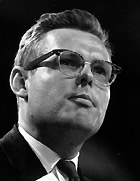 An outstanding incident for me came during one of the first House of Commons committee meetings that I helped report. It was in 1961 when the subject of generating energy using uranium was being examined. Debate centred on which of two types of reactors provided the cheapest and safest means of doing so. The Canadian uranium industry had a vital interest in the outcome of the committee hearings.
An outstanding incident for me came during one of the first House of Commons committee meetings that I helped report. It was in 1961 when the subject of generating energy using uranium was being examined. Debate centred on which of two types of reactors provided the cheapest and safest means of doing so. The Canadian uranium industry had a vital interest in the outcome of the committee hearings.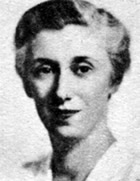 The
Honourable Ellen Fairclough, long-serving Member for Hamilton West, was the first woman to be appointed a federal cabinet minister in the history of Canada. Prime Minister Diefenbaker was proud to have made that historic appointment, and should have been well pleased with the manner in which she filled her ministerial portfolios, first as Secretary of State and subsequently as Minister of Citizenship and Immigration.
The
Honourable Ellen Fairclough, long-serving Member for Hamilton West, was the first woman to be appointed a federal cabinet minister in the history of Canada. Prime Minister Diefenbaker was proud to have made that historic appointment, and should have been well pleased with the manner in which she filled her ministerial portfolios, first as Secretary of State and subsequently as Minister of Citizenship and Immigration.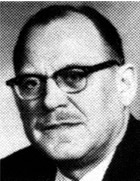 Another Ontario member to make it to cabinet was Richard Bell, the member for Carleton (Ottawa), who held the post of Minister of Citizenship and Immigration in 1962, in Diefenbaker's last government.
Another Ontario member to make it to cabinet was Richard Bell, the member for Carleton (Ottawa), who held the post of Minister of Citizenship and Immigration in 1962, in Diefenbaker's last government.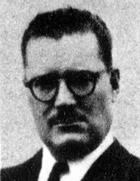 A big man was the Member for Port Arthur, with a big frame, and a big reputation. Douglas Fisher, C.C.F. and later N.D.P. stalwart, made a sensational entrance on the national political scene by defeating the formidable C.D. Howe, "Minister for Everything" in the cabinets of Mackenzie King and Louis St.-Laurent, in the General Election of 1957.
A big man was the Member for Port Arthur, with a big frame, and a big reputation. Douglas Fisher, C.C.F. and later N.D.P. stalwart, made a sensational entrance on the national political scene by defeating the formidable C.D. Howe, "Minister for Everything" in the cabinets of Mackenzie King and Louis St.-Laurent, in the General Election of 1957.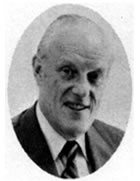 One decent man who showed that a backbencher, if he was sincere and showed persistence, could make his mark on the House of Commons, was Alfred Hales, the Member for Wellington South. Looking back at his presence in the House, to which he was first elected in 1957 at the age of 48, there was nothing to tell that the tall man with a pleasant face, calm in speech, quiet in manner, would leave a legacy that has lasted into the 21st century and may well continue for many decades to come.
One decent man who showed that a backbencher, if he was sincere and showed persistence, could make his mark on the House of Commons, was Alfred Hales, the Member for Wellington South. Looking back at his presence in the House, to which he was first elected in 1957 at the age of 48, there was nothing to tell that the tall man with a pleasant face, calm in speech, quiet in manner, would leave a legacy that has lasted into the 21st century and may well continue for many decades to come.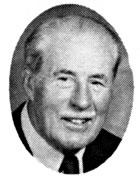 A big hitter in every sense of the word was the Honourable George Hees, member for Toronto-Broadview. Tall, mustached, athletic all his life, he had been a Brigade Major who served overseas in World War II, and thereafter became a veterans' veteran. He had a rapport with the men and women who had served Canada in war and peace that has seldom, if ever, been equalled.
A big hitter in every sense of the word was the Honourable George Hees, member for Toronto-Broadview. Tall, mustached, athletic all his life, he had been a Brigade Major who served overseas in World War II, and thereafter became a veterans' veteran. He had a rapport with the men and women who had served Canada in war and peace that has seldom, if ever, been equalled.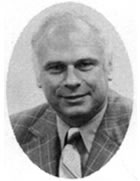 The star-crossed career of the Honourable Paul Hellyer was one of the more remarkable that it was my lot to observe as reporter and editor. Astrologists may see in it a human born under the zodiacal sign of Leo, destined to be a leader, but flawed by the inability to attract huge numbers of followers.
The star-crossed career of the Honourable Paul Hellyer was one of the more remarkable that it was my lot to observe as reporter and editor. Astrologists may see in it a human born under the zodiacal sign of Leo, destined to be a leader, but flawed by the inability to attract huge numbers of followers.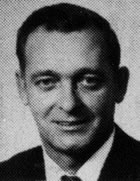 No record of Alberta Members would be complete without reference to the two Horners, John Henry (Jack), and Hugh Horner, two years his senior. As a matter of interest, when they both entered Parliament following the General Election of 1958, they did so in company with a third Horner, Albert, who was their uncle. Albert represented the Saskatchewan riding of The Battlefords, Hugh the riding of Jasper-Edson, and Jack the riding of Acadia, both in Alberta.
No record of Alberta Members would be complete without reference to the two Horners, John Henry (Jack), and Hugh Horner, two years his senior. As a matter of interest, when they both entered Parliament following the General Election of 1958, they did so in company with a third Horner, Albert, who was their uncle. Albert represented the Saskatchewan riding of The Battlefords, Hugh the riding of Jasper-Edson, and Jack the riding of Acadia, both in Alberta.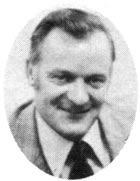 Of the three Horners Jack was the most colourful character. A rancher, he spoke his mind plainly, and he commanded an audience. Trudeau, the urbane world traveller, product of Canadian and European universities, yet a man who loved outdoor life, paid Jack the compliment of listening seriously to what he said. In the Chamber of the Commons the rancher and the Prime Minister had an unspoken respect for each other.
Of the three Horners Jack was the most colourful character. A rancher, he spoke his mind plainly, and he commanded an audience. Trudeau, the urbane world traveller, product of Canadian and European universities, yet a man who loved outdoor life, paid Jack the compliment of listening seriously to what he said. In the Chamber of the Commons the rancher and the Prime Minister had an unspoken respect for each other.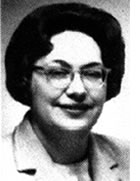 One name forever associated with Canada's centennial celebrations in 1967 is the Honourable Judy LaMarsh, a lady who endured some of the most hurtful barbs ever fired by political opponents and, it must be said, by those in the media who took a personal dislike to her.
One name forever associated with Canada's centennial celebrations in 1967 is the Honourable Judy LaMarsh, a lady who endured some of the most hurtful barbs ever fired by political opponents and, it must be said, by those in the media who took a personal dislike to her.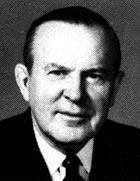 Lester Bowles Pearson was the second Canadian Prime Minister whom it was my privilege to observe and report daily as a member of the Hansard staff on the floor of the House of Commons.
Lester Bowles Pearson was the second Canadian Prime Minister whom it was my privilege to observe and report daily as a member of the Hansard staff on the floor of the House of Commons.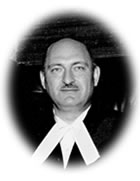 Following Michener as occupant of the Speaker's chair came the Honourable Marcel-Joseph-Aimé Lambert, who held the post for eight and a half months from September 27 1962 to May 16, 1963, the period during which the cabinet of John G. Diefenbaker self destructed. It was, to put it mildly, a time of political uproar.
Following Michener as occupant of the Speaker's chair came the Honourable Marcel-Joseph-Aimé Lambert, who held the post for eight and a half months from September 27 1962 to May 16, 1963, the period during which the cabinet of John G. Diefenbaker self destructed. It was, to put it mildly, a time of political uproar.